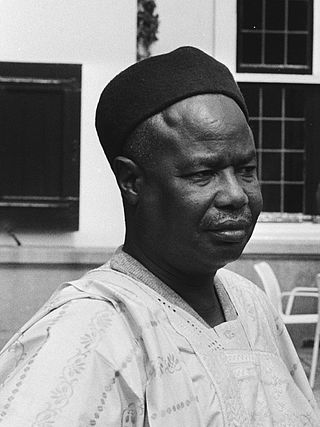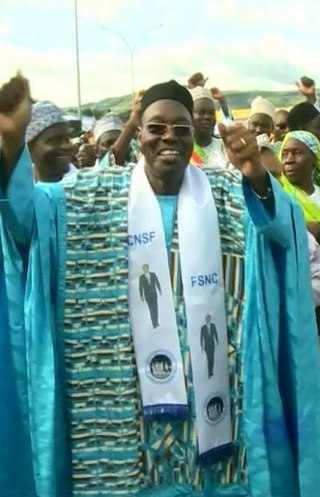External links
| | This article is about an African television station is a stub. You can help Wikipedia by expanding it. |
Equinoxe is a Cameroon-based television station. Soon after its launch, it became one of the most vocal critics of Paul Biya's regime.
The station was notorious for showing live footage of political demonstration against constitutional change in Cameroon which favoured president Biya's stay in power after 2011 when he is constitutionally barred from running for office again. The station was suspended from broadcast in January 2008 provoking widespread protest in Douala where it is based. It is even believed that it suspension was one of the remote causes of the February general strike in Cameroon against rising food prices, the cost of fuel and constitutional amendment which left over one hundred people dead (40 in official estimates) and state and private property worth millions of dollars damaged. the station has a myriad of interesting political programmes one of which is the popular 'Droit De Reponse' aired every Sunday from 12:00 currently moderated by journalist Sandrine Yamga. The TV is owned by business mogul from the West Region of Cameroon, Severin Tchounke, who also owns a critical Daily newspaper, La Nouvelle Expression. some journalists currently working for the TV station include, Herve, K, Vivian Kamwa, Nfor Hanson, Jack Ekwe Kingue, Sandrine Yanga, Julie Ngue, Chris Thobie, Roland Akong, Marcelin Ngansop, Cedric Noufele, Serge Alain Ottou, among others.
At the crossroads of West Africa and Central Africa, the territory of what is now Cameroon has seen human habitation since some time in the Middle Paleolithic, likely no later than 130,000 years ago. The earliest discovered archaeological evidence of humans dates from around 30,000 years ago at Shum Laka. The Bamenda highlands in western Cameroon near the border with Nigeria are the most likely origin for the Bantu peoples, whose language and culture came to dominate most of central and southern Africa between 1000 BCE and 1000 CE.

The politics of Cameroon takes place in the context of an electoral autocracy where multi-party elections have been held since 1992, the ruling party wins every election, and Paul Biya has been president since 1982. Since Cameroon's independence in 1960, it has been a single-party state and ruled only by two presidents: Ahmadou Ahidjo and Paul Biya. Political opposition are repressed and elections are manipulated in favor of the ruling party.

Paul Biya is a Cameroonian politician who is the second president of Cameroon since November 6, 1982, having previously been the prime minister of Cameroon from 1975 to 1982. He is the second-longest-ruling president in Africa, the longest consecutively serving current non-royal national leader in the world and the oldest head of state in the world. He is regarded as an authoritarian leader and a dictator.

The Social Democratic Front is the main opposition party of Cameroon. It was led by Ni John Fru Ndi from its foundation until his death in 2023, and receives significant support from the Anglophone Southwest and Northwest Regions.

Ahmadou Babatoura Ahidjo was a Cameroonian politician who was the first president of Cameroon, holding the office from 1960 until 1982. Ahidjo played a major role in Cameroon's independence from France as well as reuniting the French and English-speaking parts of the country. During Ahidjo's time in office, he established a centralized political system. Ahidjo established a single-party state under the Cameroon National Union (CNU) in 1966. In 1972, Ahidjo abolished the federation in favor of a unitary state.

Under the current Constitution of Cameroon, the prime minister of Cameroon is a relatively powerless position. While the prime minister is officially appointed to be the head of government, the president retains most of the executive power and can fire the prime minister at will.
An attempted coup d'état occurred in Cameroon in 1984, when presidential palace guards unsuccessfully tried to overthrow President Paul Biya. The fighting that resulted began on April 6, 1984, and ended several days later. The coup attempt is widely viewed as one of the most crucial events in the history of Cameroon since independence in 1960.

The National Assembly is the lower house of the Parliament of Cameroon. It has 180 members, elected for five-year terms in 49 single and multi-seat constituencies. Together with the senate, it constitutes the legislative arm of government.
Bello Bouba Maigari is a Cameroonian politician currently serving in Joseph Ngute's government. He was the 2nd Prime Minister of Cameroon from 6 November 1982 to 22 August 1983 and has been the National President of the National Union for Democracy and Progress (UNDP) since January 1992. Although he was a key opposition leader for much of the 1990s, he has participated in the government since December 1997; he was Minister of State for Industrial and Commercial Development from 1997 to 2004, Minister of State for Post and Telecommunications from 2004 to 2009, and Minister of State for Transport from 2009 to 2009. Since December 2011, he has been Minister of State for Tourism and Leisure.

The Constitution of Cameroon is the supreme law of the Republic of Cameroon. Adopted in 1972, it is Cameroon's third constitution. The document consists of a preamble and 13 Parts, each divided into Articles. The Constitution outlines the rights guaranteed to Cameroonian citizens, the symbols and official institutions of the country, the structure and functions of government, the procedure by which the Constitution may be amended, and the process by which the provisions of the Constitution are to be implemented.
Dakole Daïssala was a Cameroonian politician and the President of the Movement for the Defence of the Republic (MDR), a political party based in Cameroon's Far North Region. He served in the government of Cameroon as Minister of State for Posts and Telecommunications from 1992 to 1997; subsequently he was a Deputy in the National Assembly from 1997 to 2002 and then Minister of Transport from 2004 to 2007. He served in the Senate from 2013 until his death.

The 2008 Cameroon protests were a series of violent demonstrations in Cameroon's biggest cities that took place from 25 to 29 February 2008. The protests followed on the heels of a strike by transport workers, who were opposing high fuel prices and poor working conditions. Further political turmoil had been caused by President Paul Biya's announcement that he wanted the constitution to be amended to remove term limits; without such an amendment, he would have to leave office at the end of his term in 2011. Large groups of youths, whom the opposition Social Democratic Front (SDF) political party and the government blame one another for organising, took to the streets of Douala, Yaoundé, Bamenda, and other major cities, looting and vandalising property. The government sent in troops to crack down on the unrest, and protesters and troops alike were killed. The official government tally is that 40 people were killed, but human rights groups claim that the total is closer to 100. Government figures place damage to property at tens of billions of francs CFA.
Jean-Jacques Ekindi is a Cameroonian politician. He has been the National President of the Progressive Movement, an opposition political party, since its foundation in 1991, and he was a Deputy in the National Assembly of Cameroon from 2007 to 2013.
The mass media in Cameroon includes independent outlets. The nation has only one national newspaper, which is state owned.

Pius Njawé was a Cameroonian journalist and director of Le Messager as well as Le Messager Populi. Arrested over 100 times for his reporting, Njawé won several awards for his work, including the 1991 CPJ International Press Freedom Award and the 1993 Golden Pen of Freedom. In 2000, he was named one of International Press Institute's fifty World Press Freedom Heroes of the previous fifty years. In Njawé's obituary, the New York Times described him as "a symbol of opposition to the autocratic regime of Paul Biya".

Issa Tchiroma Bakary is a Cameroonian politician who served in the government of Cameroon as Minister of Transport from 1992 to 1996 and has been Minister of Communication since 2009. He is the President of the Front for the National Salvation of Cameroon, a minor political party.
Grégoire Owona is a Cameroonian politician who has served in the government of Cameroon as Minister of Labor and Social Security since December 2011. He previously served as Minister-Delegate at the Presidency for Relations with the Assemblies from 1997 to 2011, and he has also been Deputy Secretary-General of the Central Committee of the Cameroon People's Democratic Movement (RDPC) since 1992.
Garga Haman Adji is a Cameroonian politician. He served in the government of Cameroon as Minister of the Civil Service from 1990 to 1992 and is currently the President of the Alliance for Democracy and Development (ADD), a minor political party. He is also a municipal councillor in the First Arrondissement of Maroua.

Since independence, corruption has been more than prevalent in Cameroon. In fact, corruption has become pervasive and has affected all sectors of the government and civil society including the executive, judiciary, police, and even the private sector. The main causes being a deep lack of political will to fight corruption and neopatrimonialism. Other causes include; personal interests and absence of duty conscience, weak judiciary and almost nonexistent opposition in the legislative, nepotism and favouritism, ineffective system of accountability, among others.

The Anglophone problem is a socio-political issue in the modern Republic of Cameroon, rooted in the country's German, British, and French colonial legacies. Anglophone (English-speaking) Cameroonians form a minority population of around 16 percent, mainly from the northwest and southwest regions that formerly constituted the Southern Cameroons, part of the former British Cameroon colonies. These Anglophone regions were formerly controlled by Britain as a mandate of the League of Nations, and then as a United Nations trust territory. During the Foumban Conference of 1961, territories with different colonial legacies were finally united into one state.